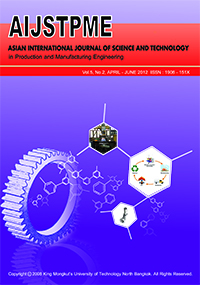Life Cycle Assessment Studies of Jatropha (Jatropha curcas) Biodiesel Production Processed by In-situ Transesterification Method
Main Article Content
Abstract
In situ transesterification is a biodiesel production method that utilizes the original lipid-bearing agricultural products instead of purified oil as the source of triglycerides for direct transesterification. This method will eliminate the costly extraction process and reduce the long production system associated with pre-extracted oil and maximize alkyl ester yield. In this paper the production of fatty acid methyl ester (FAME) by direct in situ alkaline-catalyzed transesterification of the triglycerides (TG) in jatropha seeds was investigated and its environmental performance was compared with the conventional alkali catalyzed transesterification process using LCA as a tool. In-situ transesterification process is technically offers the advantages of the production of non-toxic jatropha seed cakes. The seed cakes after in-situ transesterification is rich in protein and is a potential source of livestock feed. However, it still generates significantly higher environmental load since in-situ transestrification needs large amount of methanol and longer duration of process. A large amount of energy will be required in methanol recovery unit.
Article Details
How to Cite
Nazir, N., Mangunwidjaja, D., Yarmo, M., & Malakul, P. (2013). Life Cycle Assessment Studies of Jatropha (Jatropha curcas) Biodiesel Production Processed by In-situ Transesterification Method. Applied Science and Engineering Progress, 5(2), 13–20. retrieved from https://ph02.tci-thaijo.org/index.php/ijast/article/view/67328
Issue
Section
Technology


